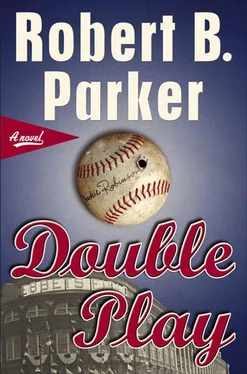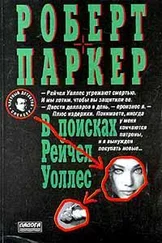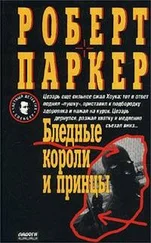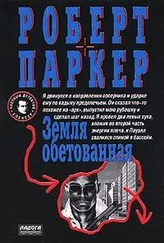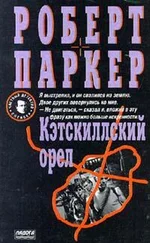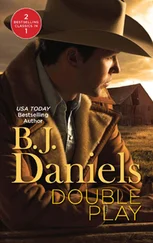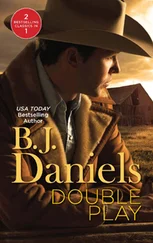“Hey, Burke,” Boucicault said loudly.
Burke said nothing. Boucicault turned Lauren so that she faced Burke in the small standing space in front of the seats. Boucicault put his left hand between Lauren’s legs and held her crotch.
“This is mine,” he said.
Lauren leaned against Boucicault as if she enjoyed the display. One of the men seated behind Boucicault leaned forward and said something to him. Boucicault pushed him back into his seat with his free hand. And stood with his hand on Lauren’s crotch and stared at Burke.
“You got anything to say, Burke?”
Burke continued to smoke, his gaze on Lauren. Her face was more flushed than it had been. Her skirt was gathered clumsily where Boucicault’s hand pressed between her legs. She turned and pushed herself in against Boucicault and kissed him again. Boucicault put both hands on her backside. Several people were now yelling for them to sit down, and a number of other people were whistling as they kissed. They held the kiss for a long time, then they broke and Boucicault took her wrist and led her up the aisle, with the three men behind them. Lauren took a long pull on the flask as they left.
Burke watched them go, then he sniped out the cigarette and turned his attention back to the game.
Sex was shameful and corrupt. All of us knew it, especially the Catholic kids, who knew it was cause for eternal damnation. And those fires of hell were far more convincing to us than the joys of salvation. We knew that VD was lurking. We knew that pregnancy was nearly unavoidable. The girls knew that if they did it no one would marry them. I knew that my mother would never speak to me again.
These were dire consequences, and we all knew them. But the great unspoken certainty was that any of us, given the chance, would have risked everything for a moment’s penetration. We knew that dirty pictures endangered our souls. But if someone had one we would rush to look. We knew that masturbation was evil. But were not dissuaded. We knew people did it. The movies even hinted at it sometimes. “Howard Hughes presents Jane Russell in The Outlaw. ” Every once in a while my parents, especially after cocktails, would be sort of huggy, as if they were more than friends who loved each other and had a son.
The culture presented premenopausal women to us as girls. In the movies married men and girls slept in separate beds. In the movies men would fight for these girls, die for their girls. In the movies girls would scream for their men, tremble for them, dress their wounds, cry for them, wait for them. Love was everywhere. Passion was everywhere. Devotion was everywhere. Self-sacrifice abounded. Sex was nowhere. Except that the girls were sexy. And they were everywhere, on the radio, in the movies, in the magazines, in the ads. The songs. “To spend one night with you, in our own rendezvous.” The lingerie ads, bathing suit ads, stocking ads, car ads, canned ham ads, beer ads, hair tonic ads, aftershave ads. All of them fresh and clean and sweet and perky and crucifyingly desirable.
In that time we were taught by women, managed by women, admonished by women, brought up by women, punished by women, all through our adolescence. Writhing in the great unacknowledged polarity between culture and biology. Yearning to get laid. Fearing for our souls.
Marriage was our hope. The happiest condition. Loving wife. Children. Contentment. Better to marry than burn.
It was nearly midnight when Burke walked down Forty-sixth Street and into a bar called Freddy’s on Eighth Avenue. It was not very busy. A Negro with a touch like Teddy Wilson was playing piano. Paglia was sitting in a big round booth near the front with Cash. There were three bottles of red wine open on the table, in front of him, and three glasses. Paglia was drinking from one of the glasses. Burke sat down in the booth.
“Trying some new wines,” Paglia said. “Want some?”
Burke shook his head. He nodded at Cash, who nodded back.
“Want something else?” Paglia said.
“I’ll take Vat 69,” Burke said. “On the rocks.”
Paglia glanced at the bar and a waiter hurried over.
“Give him Vat 69 on the rocks,” Paglia said. “Make it a double.”
The waiter hurried off.
“You been talking with Wendell Jackson,” Paglia said.
Burke shrugged. The waiter appeared, put Burke’s scotch on the table and hurried away.
“This your place?” Burke said.
“Yeah. I got a lotta places.”
Burke nodded and sipped his scotch.
“I been talking with Wendell, too,” Paglia said.
“Everybody’s talking,” Burke said aimlessly.
“I do a lot of business in Harlem,” Paglia said.
Burke held his glass up, and looked at the light through the scotch, and took another swallow.
“Me and Wendell get along.”
“Good,” Burke said.
“Need to get along with Wendell if you do business in Harlem.”
“I heard that,” Burke said.
Paglia poured some wine and drank it and poured some more.
“I like Harlem,” Paglia said. “You can buy stuff cheap and charge high. The jigs got noplace else to go.”
The Negro who played like Teddy Wilson was doing variations on “Don’t Get Around Much Anymore.”
Burke listened to the music while he waited.
“Wendell wants a favor from me,” Paglia said.
He drank some more wine.
“He wants me to give Robinson a break.”
“Stick together, don’t they,” Burke said.
“Jigaboos? Yeah, I guess they gotta. Anyway, we had a good chat, Wendell’s one of the smart ones, and I said I’d talk to you, see what we could work out.”
“White of you,” Burke said.
Cash smiled. Paglia paid no attention.
“So what do you want?” Paglia said.
“Lay off,” Burke said.
“Lay off what?”
“Lay off Robinson,” Burke said. “No shooters, nothing. Leave him alone.”
“Who told you I was botherin’ him?”
“You can probably figure that out,” Burke said.
Paglia stared at him for a time, silently, then poured some more wine, this time from a different bottle, into the same glass.
“That sonova bitch,” Paglia said. “You shoulda killed him, too.”
“Probably shoulda,” Burke said. “We got a deal?”
“That boy can play, can’t he,” Paglia said.
“Yep.”
“Hell, I’ll give him a pass,” Paglia said.
“Spell it out,” Burke said.
Paglia smiled. He was feeling the wine.
“I’ll lay off Robinson,” he said. “No shooters, nothing. I’ll leave him alone.”
“Fine,” Burke said.
Paglia smiled some more.
“You’re covered by the deal too,” he said. “Wendell likes you.”
“That’s swell,” Burke said. “I have your word?”
“You got my word, soldier,” Paglia said.
Burke finished his scotch.
“Thanks for the drink,” he said.
Paglia was drinking wine again, nodding his head in time to the piano music.
“Show him out, Cash,” Paglia said.
Cash got up and Burke followed him. They went out onto Eighth Avenue together.
“His word good?” Burke said to Cash.
“No,” Cash said. “But he’ll stick by this. As long as Wendell can squeeze him out of Harlem, if he don’t. It would cost him too much money.”
“So I can trust the money,” Burke said.
Cash grinned.
“You can always trust the money,” he said.
There were always people hanging around the players’ exit at every ballpark, many of them women. They were there when Burke and Jackie came out of Ebbets Field after a night game with the Pirates. A number of the women were Negroes, and they shrieked and giggled like bobby soxers as Jackie walked past. Burke always disliked these moments. Some women reached out toward Robinson, trying to touch him. Burke always tried to keep himself between Jackie and everyone else. No one paid him any attention. He was an invisible man in the glare of Jackie’s visibility.
Читать дальше
